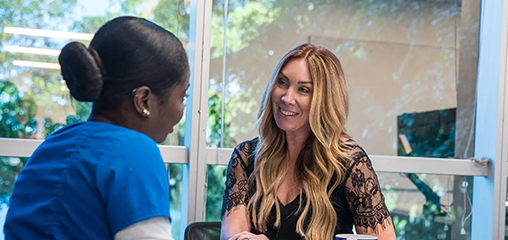
As a junior in high school, I volunteered at a hospital in a pediatric unit. On my first day, I saw kids in the playroom, hooked up to IV pumps and laughing with each other. I remember being amazed by the resiliency of sick children and their sense of hope. It was that experience that helped me decide to be a pediatric nurse. After graduation, I pursued my education in nursing. It turns out pediatric nursing is a great career for me!
I’ve created this guide to walk you through an overview of the pediatric nursing field, and share my own experiences along the way. By sharing my perspective, I hope to help you determine if this nursing career path is right for you.
What is Pediatric Nursing?
Pediatric nursing is a discipline focused on providing nursing care for children in procedure areas, emergency rooms, inpatient units, or intensive care units. Pediatric nurses consider child development and the parent-child relationship when delivering nursing care.
Pediatric Nursing: Why Choose This Path?
After graduating from nursing school, I began my career in a busy pediatric inpatient unit. Many children I cared for suffered from infections, had a chronic disease, or needed surgery. Most were only there for a short time and ultimately were discharged home quickly. During my orientation, I started understanding the unique challenges and rewards of working with children. Despite these challenges, I pursued pediatric nursing because I wanted to help kids.
I remember the first time I was confident in my role as a pediatric nurse. A few months into my career, I had to place an IV on a preschool-aged child. I let the child play with my tools as I started getting my supplies out. They squirted the saline syringe and felt the flexible catheter. We gave the IV a nickname, “Tubey.” I explained the procedure to the child, being honest that it may sting for a moment but that “Tubey” had a very important job. Despite a few anxious tears, the child calmly tolerated the entire procedure and was smiling within moments of completion.
I felt so empowered. I realized I could explain this procedure in a playful way that the child understood. This is where the beauty of pediatric nursing lies. Pediatric nurses have the magical ability to meet each child where they are, acting as a guide through an otherwise foreign and scary situation.
The Reality of Early Career Nursing
While pediatric nursing can be cheery with days spent in the playroom, it has its challenges. Ultimately, I transitioned into the pediatric intensive care unit, but I did not anticipate how difficult this environment would be. These kids were really sick, many experiencing life-threatening illnesses.
One particularly challenging shift involved a very young child with a severe diagnosis. I remember knowing early in my shift that the doctors would be speaking with the child’s parents about their new findings.
The parents did not see this diagnosis coming; I will never forget the mother’s cries. The doctors stepped away after sharing this news, leaving me to care for the family. I did everything in my power to make that awful day just a little bit better. I distracted the child, who was far too young to understand, and I made sure the parents had something to eat. Finally, I cried with the family as they thanked me for the care that day. As a pediatric nurse, I was able to offer support and strength to a family that needed it. Each year I’m reminded of this when I see photos of that now-healthy child.
The Bright Side: Things That Turned Out to Be Easier or More Rewarding Than Expected
 When things go well, it is amazing to celebrate with the patient and their family. Some of my favorite nursing memories include sending a healthy child home. Pediatric bubble parades are a must-attend event, celebrating a child being discharged, usually after a prolonged hospital stay. Staff line the hallways, blowing bubbles and cheering as the child proceeds off the unit. We also had dance parties after successful surgeries, trick or treating on Halloween in the pediatric unit, and slime activities in the playroom.
When things go well, it is amazing to celebrate with the patient and their family. Some of my favorite nursing memories include sending a healthy child home. Pediatric bubble parades are a must-attend event, celebrating a child being discharged, usually after a prolonged hospital stay. Staff line the hallways, blowing bubbles and cheering as the child proceeds off the unit. We also had dance parties after successful surgeries, trick or treating on Halloween in the pediatric unit, and slime activities in the playroom.
Even when they are sick, kids still want to have fun! Caring for young patients, pediatric nurses tend to be a fun bunch. As a new pediatric nurse, I was pleasantly surprised about how much fun I had at work. There are always craft events, dress-up days, and potlucks. Pediatric nursing staff are a tight-knit group of people who share a desire to heal kids. Having such engaged colleagues made it easier for me to transition into my role as a new pediatric nurse.
Essential Tips for Early Career Pediatric Nurses
So how do you succeed in this rewarding field? Transitioning into pediatric nursing, and nursing in general, can be overwhelming. Here are some of my most important suggestions for new nurses:
- Identify a support system. Find an experienced nurse or a clinical instructor that you look up to. Ask questions, reach out for support, and ask for feedback. Take advantage of any peer support and new graduate nursing programs offered.
- Prioritize self-care. Moments of mindfulness during the workday help me remain grounded during particularly challenging shifts. Think about things that bring you comfort. Begin incorporating them into your work or clinical days during routine tasks. For instance, whenever I wash my hands at work, I take a few deep breaths and think about my family. Each time I wash my hands, I am grounded by my breath and my thoughts. This allows me to move on with my day feeling more relaxed so I can bring my best self to each of my patients.
- Rely on your critical thinking. In pediatric nursing, there can be moments of stress where your emotions are running high. It’s important in these periods of stress to remember and rely on your critical thinking skillset. Critical thinking can help you to more accurately assess any medical situation, and create the most effective next steps for patient care.
Why the Right Educational Foundation is Crucial
If pediatric nursing feels like a good fit for you, the first step is to obtain a nursing degree. Arizona College of Nursing’s CCNE-accredited program will provide you a strong foundation for your nursing practice. With BSN programs offered across 18 -campus locations, there is likely an opportunity near you. Their tailored NCLEX- preparation will get you ready for the national licensing exam after graduation. At Arizona College of Nursing, you will work with skilled faculty in the classroom, simulation lab and clinical settings to prepare you for your future as a Registered Nurse. During your third year, you’ll have the opportunity to see first-hand what being a pediatric nurse is like during your pediatric health practicum. If you are like me, you might even discover your passion for caring for these young patients.
Author Bio:
 Emily Mallory is a master’s prepared Registered Nurse and writer based in New England. She started her career working in inpatient pediatrics and the pediatric intensive care unit at tertiary medical centers. While precepting nursing students in the pediatric units, Emily discovered her passion for nursing education. Currently practicing as a nurse educator, Emily facilitates clinical rotations for a local university. She also works clinically at a community hospital in both the Intensive Care Unit and Emergency Room, where she often finds herself caring for pediatric patients.
Emily Mallory is a master’s prepared Registered Nurse and writer based in New England. She started her career working in inpatient pediatrics and the pediatric intensive care unit at tertiary medical centers. While precepting nursing students in the pediatric units, Emily discovered her passion for nursing education. Currently practicing as a nurse educator, Emily facilitates clinical rotations for a local university. She also works clinically at a community hospital in both the Intensive Care Unit and Emergency Room, where she often finds herself caring for pediatric patients.
Start Your Future in Nursing Today

If you’re considering a career as a registered nurse (RN), Arizona College of Nursing is here to help you pursue your dream. Our BSN program enables you to earn a Bachelor of Science in Nursing in just 3 years or less with qualifying transfer credits. We’ve helped hundreds of students to earn a BSN degree and enter the nursing profession – and we’re ready to support you on your path to becoming an RN.
Why Choose Arizona College of Nursing?
- Earn a BSN degree in 3 years or less with eligible transfer credits
- Campus locations throughout the US
- Night classes for general education courses
- Hybrid Online/In-Person format for general education classes
- Nursing education is all we do
- CCNE-Accredited Program*
- NCLEX-RN success coaches and exam preparation class
- Financial aid available to those who qualify
Discover Your Path to a Career in Nursing
Information in this post is accurate as of January 11, 2024.
*The Bachelor of Science in Nursing (BSN) degree program at Arizona College of Nursing is accredited by the Commission on Collegiate Nursing Education (https://www.aacnnursing.org/). All Arizona College of Nursing and Arizona College campuses are institutionally accredited by the Accrediting Bureau of Health Education Schools (https://www.abhes.org/), a U.S. Department of Education-recognized accrediting agency.








